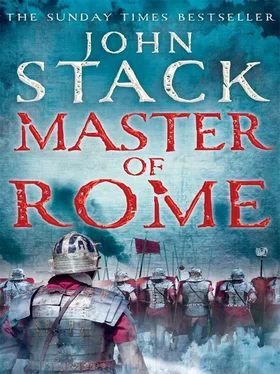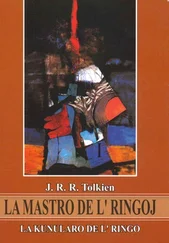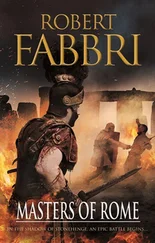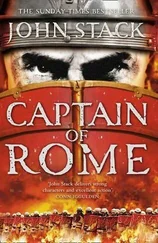John Stack - Master of Rome
Здесь есть возможность читать онлайн «John Stack - Master of Rome» — ознакомительный отрывок электронной книги совершенно бесплатно, а после прочтения отрывка купить полную версию. В некоторых случаях можно слушать аудио, скачать через торрент в формате fb2 и присутствует краткое содержание. Жанр: Исторические приключения, на английском языке. Описание произведения, (предисловие) а так же отзывы посетителей доступны на портале библиотеки ЛибКат.
- Название:Master of Rome
- Автор:
- Жанр:
- Год:неизвестен
- ISBN:нет данных
- Рейтинг книги:4 / 5. Голосов: 1
-
Избранное:Добавить в избранное
- Отзывы:
-
Ваша оценка:
- 80
- 1
- 2
- 3
- 4
- 5
Master of Rome: краткое содержание, описание и аннотация
Предлагаем к чтению аннотацию, описание, краткое содержание или предисловие (зависит от того, что написал сам автор книги «Master of Rome»). Если вы не нашли необходимую информацию о книге — напишите в комментариях, мы постараемся отыскать её.
Master of Rome — читать онлайн ознакомительный отрывок
Ниже представлен текст книги, разбитый по страницам. Система сохранения места последней прочитанной страницы, позволяет с удобством читать онлайн бесплатно книгу «Master of Rome», без необходимости каждый раз заново искать на чём Вы остановились. Поставьте закладку, и сможете в любой момент перейти на страницу, на которой закончили чтение.
Интервал:
Закладка:
‘Carthaginian galley approaching,’ Corin called from the masthead, and Atticus looked to the outer harbour, the lone galley’s oars falling and rising slowly, the formation of enemy ships behind her unchanged.
‘An envoy?’ Septimus suggested. Atticus nodded.
‘But why now?’ he asked, and turned to look for his second-in-command. ‘Baro, get us under way. Signal the other galleys to make ready but to hold station.’
Baro nodded and the Orcus moved off at steerage speed before Gaius, the helmsman, brought her up to standard. Atticus and Septimus moved to the foredeck, the centurion ordering a contubernia of ten legionaries to accompany them, and both men lapsed into silence as they watched the opposing galley approach.
The two galleys approached each other warily, as if manoeuvring for position, the helmsmen testing each other’s skill. The Carthaginian ship was first to slow its advance and her oars dropped neatly into the water, their combined drag bringing the quinquereme to a halt within a half-ship length before two oars re-engaged fore and aft to keep the galley steady in the gentle current. Atticus turned and nodded down the length of the galley. Gaius acknowledged the gesture and carried out the same manoeuvre with similar ease; as the two ships covered the remaining distance, in silence now that the drum beat had halted, Atticus stared across at the group of armed men standing on the enemy foredeck.
Two Carthaginians stepped forward and Atticus and Septimus responded in kind, moving to the starboard forerail as the galleys kissed with a heavy thud, the timber hulls grinding against each other, each moving independently in the swell as the oars maintained the connection. Atticus focused his attention on the taller of the two Carthaginians, noticing how the other deferred to him. He was of a similar age to Atticus but his bearing was that of an older man, his self-assurance clearly evident in his expression. He stood with his shoulders slightly stooped as if poised to charge. Atticus made to address him but the Carthaginian spoke first.
‘You are Perennis?’ he asked.
Atticus was taken aback. ‘You have me at a disadvantage, Carthaginian,’ he said, and waited for the officer to introduce himself.
The Carthaginian smiled, as if relishing a private joke. ‘I am Hamilcar Barca,’ he said, and again Atticus was stunned. ‘You know of me,’ Hamilcar said.
‘I know of you, Barca,’ Atticus replied coldly. ‘You were the commander of the quinquereme that escaped Tyndaris.’ The memory formed quickly in his mind and he felt Septimus shift restlessly beside him, the centurion’s anger stirred at the discovery of whom they were addressing, remembering the desperate fight at Tyndaris that had cost him so many of his men.
‘And you, Perennis, were the commander of the trireme that attacked this ship at Ecnomus,’ Hamilcar replied, uttering the words to stoke the fire of his anger.
There was a moment’s silence.
‘What have you to say, Barca?’ Atticus asked, an edge to his voice, keen to forestall any inconsequential talk and draw the line of battle between them.
‘I have come here to offer you terms of surrender,’ Hamilcar said, struggling to control his temper at the Greek’s arrogant tone.
‘There will be no surrender, Barca. Not at Aspis.’
‘The Roman invasion of my country is finished, Perennis. Your pitiful force cannot stand alone.’
‘It will stand as long as I am in command,’ Atticus replied defiantly.
‘But it is not you who commands here, Perennis,’ Hamilcar smiled, and he tossed a brass cylinder across the gap between the galleys.
Atticus snapped it from the air and opened it, drawing out the scroll within. He broke the seal and quickly read the contents, immediately recognizing the handwriting from earlier dispatches. His mouth twisted in anger.
‘What is it?’ Septimus asked, noticing his friend’s agitation. Atticus handed him the scroll without comment and Septimus glanced through it. ‘An order to surrender?’ he said in disbelief.
Atticus nodded. ‘From the proconsul himself,’ he spat, knowing now why the Carthaginians hadn’t attacked over the previous days. He took the scroll from Septimus and read it through again in an effort to detect a subtext to the proconsul’s order, some sign that the order was written under duress and his true intent was for the fleet to resist the Carthaginians. There was none. The order was explicit.
‘Regulus knows of the blockade,’ Hamilcar said to compound the order, to gain the Greek’s surrender immediately by justifying the proconsul’s decision. ‘Given the odds, he has realized you can surrender with honour.’
Atticus looked up and stared at Hamilcar with an expression of disdain. ‘With honour?’ he said sarcastically. ‘There’s no honour in being chained to a galley oar.’
‘Nevertheless,’ Hamilcar said impatiently. ‘You have your orders, written by your own commander. You must surrender now.’
Atticus looked to the blockade and then to Septimus, the centurion’s defiant expression a reflection of his own conviction. He nodded slightly, and Septimus returned the gesture, in full agreement with his friend.
Atticus carefully placed the scroll back inside the cylinder and turned once more to Hamilcar. ‘There will be no surrender,’ he replied, and before Hamilcar could protest, Atticus dropped the cylinder over the side, the brass container striking the hull with a hollow clang before splashing into the water.
Hamilcar followed its fall, the gesture triggering a cacophony of conflicting voices in his mind. He looked up and focused once more on the Greek commander, his vision narrowing as the dispute inside him intensified. His pride called for immediate attack, to humble the insolent Greek and give his own men the victory their morale so desperately needed after the defeat at Ecnomus. But reason called for restraint, knowing he needed the forty Roman galleys to strengthen his depleted navy; to take them by force would cost him as many galleys as he would gain. He breathed deeply and forced his pride to yield, deciding to give the Greek one last chance, putting the needs of Carthage ahead of his own honour. He leaned forward over the forerail of the Alissar.
‘Hear me, Perennis,’ he said, suppressed hostility hardening his voice. ‘I will give you twenty-four hours to reconsider your decision.’
Atticus made to retort, but Hamilcar raised his hand to forestall him, no longer trusting his own temper, knowing that further words from the Greek might cause him to abandon his restraint.
‘Comply, Perennis, and you and your crews will live,’ he said. ‘Defy me and — I swear by my gods — you will all die.’
Hamilcar stepped back and turned, issuing orders for the Alissar to withdraw. Her oars were re-engaged, the ship turning neatly away.
Atticus watched the galley retreat, the Carthaginian’s ultimatum weakening his previously unassailable defiance. With Barca in command, the odds against him were now greater than ever. He tried to suppress his uncertainty, knowing that Fortuna alone controlled his fate and he would rather die facing the enemy than live as a slave. He turned to order Baro to get the Orcus under way, but as he did the wind suddenly ebbed and slackened, allowing, for the first time, the drum beats of the Carthaginian blockade to be heard. It was a staccato beat, two hundred strong, like the sound of oncoming thunder, a presage of the storm that was poised to break over Aspis.
CHAPTER TWO
Marcus Aemilius Paullus strode purposefully across the main deck of the Concordia, ignoring the salutes of the soldiers he passed on his way to the side rail. He looked out over the fleet, the three hundred and fifty galleys of the Classis Romanus spread out in formation behind his flagship, and his heart swelled, the sight overwhelming him, the power of his command filling him with pride.
Читать дальшеИнтервал:
Закладка:
Похожие книги на «Master of Rome»
Представляем Вашему вниманию похожие книги на «Master of Rome» списком для выбора. Мы отобрали схожую по названию и смыслу литературу в надежде предоставить читателям больше вариантов отыскать новые, интересные, ещё непрочитанные произведения.
Обсуждение, отзывы о книге «Master of Rome» и просто собственные мнения читателей. Оставьте ваши комментарии, напишите, что Вы думаете о произведении, его смысле или главных героях. Укажите что конкретно понравилось, а что нет, и почему Вы так считаете.










